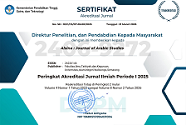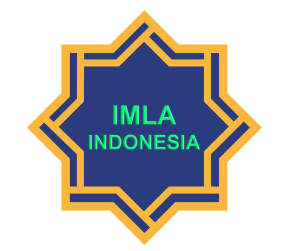Penerapan Metode Audiolingual dalam Pembelajaran Keterampilan Menyimak Bahasa Arab secara Daring: Studi Kasus di SMPIT Adzkia Padang
DOI:
https://doi.org/10.21580/alsina.6.1.23100Keywords:
Arabic learning, audiolingual method, listening skills, online learningAbstract
This study aims to investigate the implementation of the audiolingual method in teaching Arabic listening skills at SMPIT Adzkia Padang during the COVID-19 pandemic. The research employs a qualitative descriptive approach, with data collected through structured observations and in-depth interviews with eighth-grade students and Arabic language teachers. The findings reveal that the audiolingual method positively impacts students' listening skills, with nearly 90% of students being able to memorize, recall, and use the sentences or texts taught. However, online learning and time constraints posed challenges to the optimal application of this method. Teacher perceived the audiolingual method as less effective for online learning and suggested that lecture-based methods were more suitable for explaining theoretical concepts. The study also found that the Arabic learning guidebook needed to be aligned with the students' proficiency levels, which hindered the learning process. These findings provide educators with insights regarding the audiolingual method's strengths and limitations, emphasizing the importance of adapting teaching methods to the context and students' needs.
Downloads
References
Ahmadova, Esmira. “On Organizing Online Lessons Using the Zoom Program.” Scientific Bulletin 1, no. 1 (2020): 31–36. https://doi.org/10.54414/hrwx7278.
Brown, H. Douglas. Principles of Language Learning and Teaching. 5th ed. New York: Pearson Education, 2007.
Budianto, Langgeng, and Yudhi Arifani. “Utilizing WhatsApp-Driven Learning during COVID-19 Outbreak: EFL Users’ Perceptions and Practices.” CALL-EJ 22, no. 1 (2021): 264–81. https://callej.org/index.php/journal/article/view/331.
Burke, Paul F, Sandy Schuck, and Matthew Kearney. “Teachers’ Experiences of Emergency Remote Schooling During the Pandemic: Drivers for Student and Teacher Wellbeing.” Australian Journal of Education 67, no. 2 (2023): 124–42. https://doi.org/10.1177/00049441231159666.
Dhawan, Shivangi. “Online Learning: A Panacea in the Time of COVID-19 Crisis.” Journal of Educational Technology Systems 49, no. 1 (2020): 5–22. https://doi.org/10.1177/0047239520934018.
Effendy, Ahmad Fuad. Metodologi Pengajaran Bahasa Arab. Malang: Misykat, 2012.
Goh, Christine C.M., and Larry Vandergrift. Teaching and Learning Second Language Listening: Metacognition in Action. New York: Routledge, 2012. https://doi.org/10.4324/9780203843376.
Herliandry, Luh Devi, Nurhasanah Nurhasanah, Maria Enjelina Suban, and Heru Kuswanto. “Pembelajaran Pada Masa Pandemi Covid-19.” JTP - Jurnal Teknologi Pendidikan 22, no. 1 (2020): 65–70. https://doi.org/10.21009/jtp.v22i1.15286.
Hermawan, Acep. Metodologi Pembelajaran Bahasa Arab. Bandung: PT. Remaja Rosdakarya, 2014.
Humaidah, Nur, and Niswatush Sholihah. “Relevansi Penerapan Metode Audiolingual dalam Pembelajaran Bahasa Arab di Lembaga Pendidikan Indonesia.” Arabia : Jurnal Pendidikan Bahasa Arab 8, no. 2 (2016): 306–26. https://doi.org/10.21043/arabia.v8i2.2006.
Kusumadewi, Novita, and Dhiva Ulhusna. “ISMIK (Istima’ Asik) Media Pembelajaran Berbasis Cross Cultural Understanding terhadap Ketrampilan Menyimak Bahasa Arab Siswa MTS Kelas VII.” In SEMNASBAMA (Seminar Nasional Bahasa Arab), 3:154–63. Malang: Universitas Negeri Malang, 2019. https://prosiding.arab-um.com/index.php/semnasbama/article/view/444.
Laksmi, R. “Effective Listening Enhances the Process of Communication.” The IUP Journal of English Studies 12, no. 1 (2017): 7–10. https://www.iupindia.in/1703/English Studies/Effective_Listening_Enhances.html.
Larsen-Freeman, Diane. Techniques and Principles in Language Teaching. 2nd ed. Oxford: Oxford University Press, 2000.
Letmiros, Letmiros. “Arabic: Why Indonesian Have to Learn It?” International Review of Humanities Studies 4, no. 2 (2019): 610–24. https://doi.org/10.7454/irhs.v4i2.166.
Margolis, Fern S. “Encouraging Spontaneous Speech in the Audiolingual Classroom.” Foreign Language Annals 15, no. 2 (1982): 127–31. https://doi.org/10.1111/j.1944-9720.1982.tb00237.x.
Muhammad, Rashid, and Annamalai Nagaletchimee. “WhatsApp and English Language Learning: Students’ Experiences during the Pandemic in Pakistan.” Mextesol Journal 47, no. 3 (2023): 1–13. https://doi.org/10.61871/mj.v47n3-10.
Munip, Abdul. “Tantangan dan Prospek Studi Bahasa Arab di Indonesia.” al Mahāra: Jurnal Pendidikan Bahasa Arab 5, no. 2 (2020): 303–18. https://doi.org/10.14421/almahara.2019.052.08.
Mustofa, Bisri, and M Abdul Hamid. Metode & Strategi Pembelajaran Bahasa Arab. Malang: UIN Maliki Press, 2016.
Nasution, Sahkholid. “Pengembangan Kurikulum Bahasa Arab di Madrasah Berbasis Karakter.” Bahasa dan Seni: Jurnal Bahasa, Sastra, Seni dan Pengajarannya 44, no. 2 (2016): 135–48. https://doi.org/10.17977/um015v44i22016p135.
Ngwoke, Festus Uwakwe, Walter Ugwuagbo, and Basil Okwudilichukwu Nwokolo. “Refocusing on Listening Skills and Note-Taking: Imperative Skills for University Students’ Learning in an L2 Environment.” Theory and Practice in Language Studies 12, no. 7 (2022): 1241–51. https://doi.org/10.17507/tpls.1207.01.
Richards, Jack C., and Theodore S. Rodgers. Approaches and Methods in Language Teaching. Cambridge: Cambridge University Press, 2014. https://doi.org/10.1017/9781009024532.
Sardiyana Sardiyana. “Pendekatan dan Metode Audio Lingual (Analisis Metode Sam’iyah Safawiyah).” NASKHI :Jurnal Kajian Pendidikan dan Bahasa Arab 1, no. 1 (2019): 14–20. https://doi.org/10.47435/naskhi.v1i1.67.
Sayimkulova, Sholpan, Assel Chaklikova, Jamila Dosmagambetova, Batyrkhan Auyezov, and Kulshat Smagulova. “Formation of the Ability to Listen in English.” XLinguae 16, no. 2 (2023): 46–53. https://doi.org/10.18355/XL.2023.16.02.04.
Syakur, Nazri. A. Behaviorisme dan Humanisme dalam Pembelajaran Bahasa Arab. Yogyakarta: Pustaka Madani, 2009.
Valledor, Adrián, Alvaro Olmedo, Carlos J. Hellín, Abdelhamid Tayebi, Salvador Otón-Tortosa, and Josefa Gómez. “The Eclectic Approach in English Language Teaching Applications: A Qualitative Synthesis of the Literature.” Sustainability 15, no. 15 (2023): 11978. https://doi.org/10.3390/su151511978.
Vandergrift, Larry. “Recent Developments in Second and Foreign Language Listening Comprehension Research.” Language Teaching 40, no. 3 (2007): 191–210. https://doi.org/10.1017/S0261444807004338.
Zulherman, Zulherman, Zalik Nuryana, Astadi Pangarso, and Farah Mohamad Zain. “Factor of Zoom Cloud Meetings: Technology Adoption in the Pandemic of COVID-19.” International Journal of Evaluation and Research in Education (IJERE) 10, no. 3 (2021): 816–25. https://doi.org/10.11591/ijere.v10i3.21726.
Downloads
Published
How to Cite
Issue
Section
License
Copyright (c) 2024 Alsina : Journal of Arabic Studies

This work is licensed under a Creative Commons Attribution-NonCommercial-ShareAlike 4.0 International License.
Copyright
The copyright of the received article shall be assigned to the publisher of the journal. The intended copyright includes the right to publish the article in various forms (including reprints). The journal maintains the publishing rights to published articles. Authors are allowed to use their articles for any legal purposes deemed necessary without written permission from the journal, but with an acknowledgment to this journal of initial publication.
Licensing
In order for Alsina: Journal of Arabic Studies to publish and distribute research articles, the editors need publishing rights (transferred from author to publisher). This agreement relates to the transfer/publishing copyright license to Alsina: Journal of Arabic Studies but the authors still have significant rights to use and share their published articles.
Alsina: Journal of Arabic Studies supports the need for writers to share, disseminate and maximize the impact of their research and their rights on any database. As a journal article writer, you have the right to various uses of your articles, including that by the institution or company where you work. Copyright can be used without the need for special permission. Authors who publish articles in the Alsina: Journal of Arabic Studies have broad rights to use their work for teaching and scientific purposes without requesting permission, including:
- Use by the author for lectures, presentations, or conferences, with distribution of copies to participants;
- Distribution to colleagues for research use;
- Use in compilations of the author's subsequent work;
- inclusion in a thesis or dissertation;
- Reuse of sections or excerpts from articles in other works (with full acknowledgment of the final article);
- Preparation of derivative works (other than commercial purposes) (with full acknowledgment of the final article);
- Voluntary posting on open websites operated by authors’ or writers' agencies for scientific purposes
When submitting a manuscript, authors do so on the understanding that if accepted for publication, the copyright for publishing (publishing right) of the article shall be assigned/transferred to Alsina: Journal of Arabic Studies.
Authors whose articles are accepted for publication will receive confirmation via email and sent a Copyright Transfer Agreement.

 Accreditation
Accreditation 
 In Collaboration with
In Collaboration with 

 Visitors
Visitors  Article Template
Article Template





